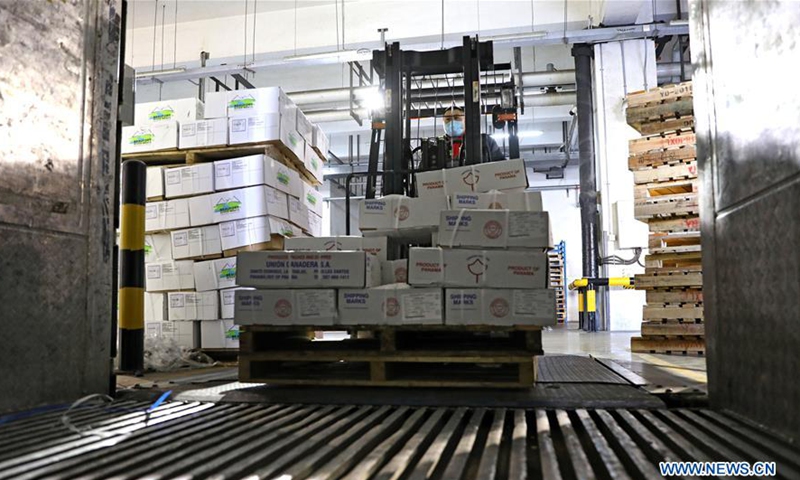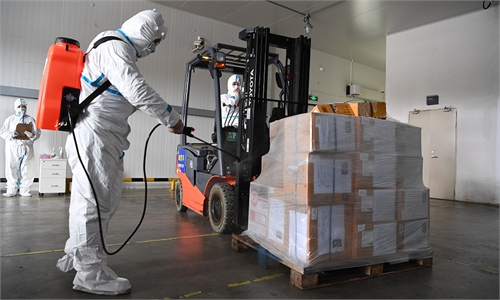SOURCE / INDUSTRIES
Clearance measures slow movement of overseas cold-chain food, importers call for streamlined process
Importers face longer clearance times, repeated sterilization measures

A worker unloads boxes of imported frozen meat at a cold storage at Dalian port in Dalian, northeast China's Liaoning Province, April 8, 2020. Since it resumed operation, the port has streamlined its cold chain operation attempting to achieve greater efficiency. (Xinhua/Yao Jianfeng)
While tougher sterilization and inspection have greatly reduced the risks of imported coronavirus cases via cold-chain food in China, some importers have felt rising pressure from longer clearance times at ports, which can take up to half a month. Industry insiders said that strict precautions are necessary but the process must be streamlined to smooth supply chains.
Some importers have complained that repeated sterilization and inspection procedures, and lack of common recognition of examination certificates over nucleic acid testing between cities and provinces, have created hurdles to food delivery, media reports said.
Yang Meng, a meat importer, confirmed with the Global Times that the company has imported hundreds of containers of goods, mainly through the Tianjin port. There's a backlog for clearance now and this has caused costs to rise.
"Our order was placed two months ago for the Spring Festival next year, with a fixed delivery date," said Yang. All of his shipments have been delayed for as long as a month.
"In previous years, goods could be claimed the day after arrival, but now it takes at least half a month, with tens of thousands of yuan of demurrage per container," said Yang. He said he doesn't blame the local customs staff, who aim to complete clearance as soon as possible, but inspection and sterilization take time.
Since June 2020, several regions have reported positive cases of imported cold chain food, with the importing countries of the highest number of cases included Ecuador, Brazil, Argentina and Russia, involving frozen fish, shrimp and other poultry products. Several ports along China's coastline have repeatedly found positive imported cases.
Among the ports, those of Dalian, Qingdao and Tianjin handled the most imported food, and given the previous imported cases on the imported cold-chain food or food package at these ports, the strict elimination can be understandable, Fan Xubing, president of Beijing Seabridge Marketing, a leading shrimp importer, told the Global Times on Monday.
Fan said that while sterilization for imported foods is necessary, there is room for improvement in the process.
"For example, mutual recognition among regions will eliminate the need to sterilize the same batch of foods repeatedly. Also, imported products should be differentiated by risk levels, depending on their sources," said Fan.
There is a backlash against the preventative measures in some places. Although the Joint Prevention and Control Office of the State Council does not require repeated sterilization, some local authorities are still doing so, Qin Yuming, secretary general of the cold chain logistics professional committee of the China Federation of Logistics & Purchasing, told the Global Times.
"There are three or more sterilization processes between the product landing and the marketplace, because local governments have not yet achieved mutual recognition for inspections," said Qin. Wider use of technology would enable officials and industry participants to share tracing information on a national platform.
China is the largest importer of aquatic products, which are an important supplement to the domestic consumer market, said Cui He, president of the China Aquatic Products Processing and Marketing Alliance. It is important to minimize risks but this process calls for joint efforts of all industry participants, both domestic and overseas, Cui said.
Despite the hurdles, imports of agricultural products have generally remained stable. The value exceeded 967 billion yuan ($147 billion) from January to October this year, up by 170,000 yuan from a year earlier, Customs data shows.
As a person who has been in the business for years, Yang said that temporary disruptions are understandable as prevention is important for the sustainability of the supply chain amid the global outbreak.
"Our imported goods are stable in size because market demand is there," said Yang.

